Facilitating Work Teams: Theories, Roles, and Tesco PLC Example
VerifiedAdded on 2023/06/18
|7
|1852
|251
Report
AI Summary
This report provides a comprehensive overview of facilitating work teams, emphasizing the importance of team development in organizational success. It explores Tuckman's theory of team development, detailing the forming, storming, performing, and adjourning stages. The report also examines Belbin's team roles, highlighting the significance of plants, resource investigators, monitor evaluators, coordinators, shapers, implementers, team workers, completer-finishers, and specialists. The role of communication, innovation, responsibility, and health and safety measures in enhancing team performance is also discussed. Tesco PLC is used as a practical example to illustrate these concepts. The report concludes by emphasizing the importance of teamwork for efficient project completion and organizational goal achievement, with a focus on continuous performance improvement through training and motivational initiatives. Desklib offers a variety of resources, including past papers and solved assignments, to aid students in their studies.
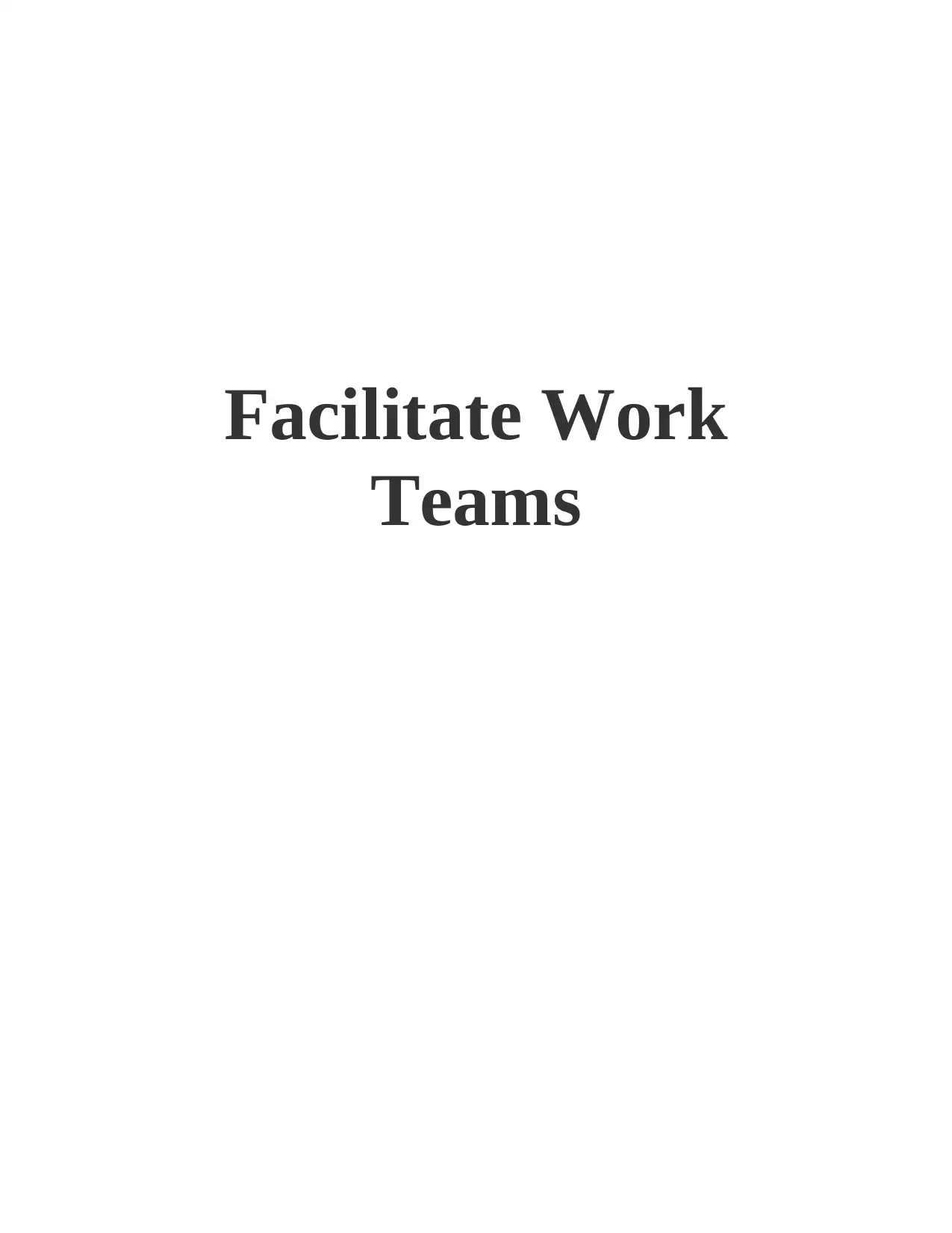
Facilitate Work
Teams
Teams
Paraphrase This Document
Need a fresh take? Get an instant paraphrase of this document with our AI Paraphraser

Table of Contents
INTRODUCTION...........................................................................................................................3
MAIN BODY ................................................................................................................................3
CONCLUSION ...............................................................................................................................6
REFERENCES................................................................................................................................7
INTRODUCTION...........................................................................................................................3
MAIN BODY ................................................................................................................................3
CONCLUSION ...............................................................................................................................6
REFERENCES................................................................................................................................7
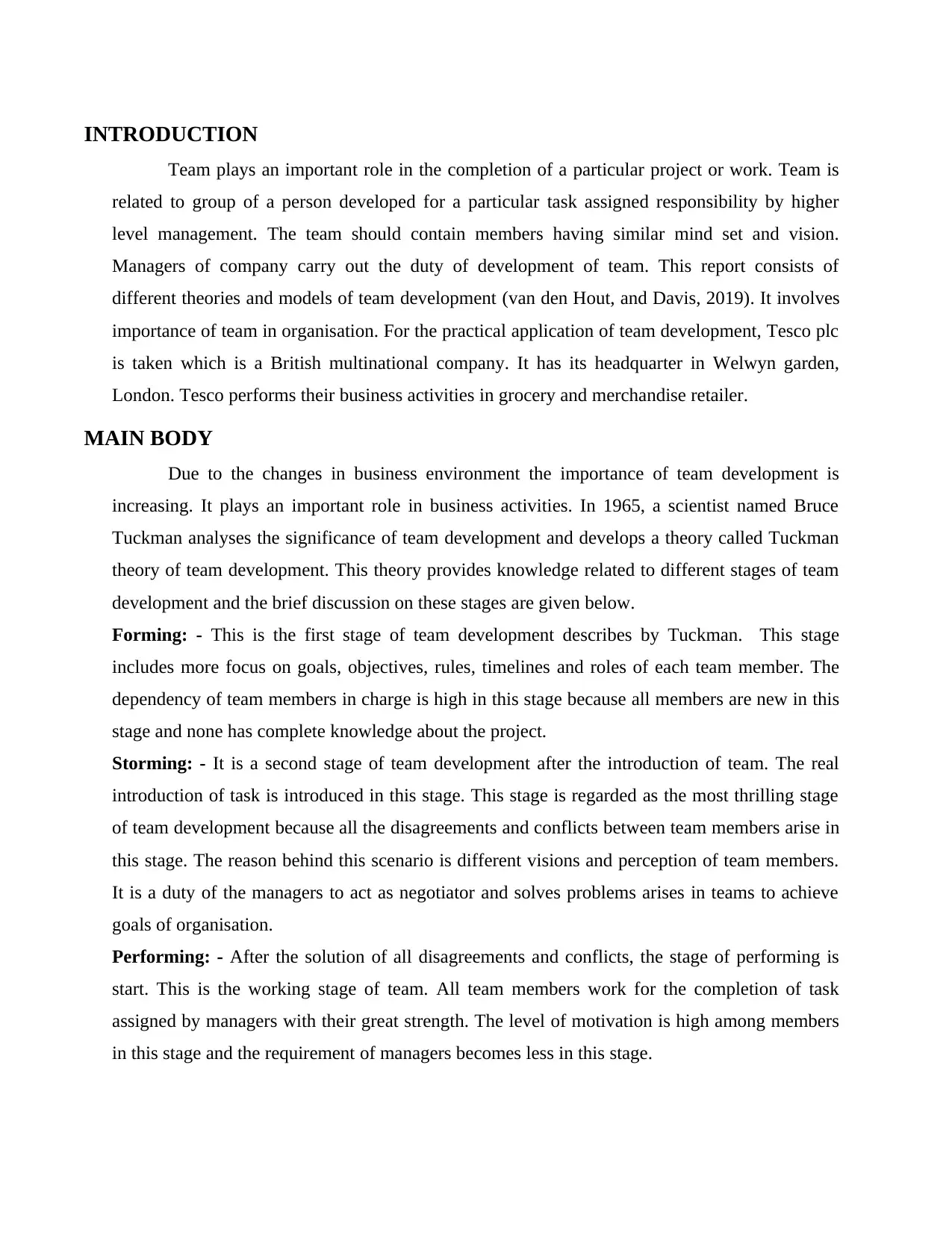
INTRODUCTION
Team plays an important role in the completion of a particular project or work. Team is
related to group of a person developed for a particular task assigned responsibility by higher
level management. The team should contain members having similar mind set and vision.
Managers of company carry out the duty of development of team. This report consists of
different theories and models of team development (van den Hout, and Davis, 2019). It involves
importance of team in organisation. For the practical application of team development, Tesco plc
is taken which is a British multinational company. It has its headquarter in Welwyn garden,
London. Tesco performs their business activities in grocery and merchandise retailer.
MAIN BODY
Due to the changes in business environment the importance of team development is
increasing. It plays an important role in business activities. In 1965, a scientist named Bruce
Tuckman analyses the significance of team development and develops a theory called Tuckman
theory of team development. This theory provides knowledge related to different stages of team
development and the brief discussion on these stages are given below.
Forming: - This is the first stage of team development describes by Tuckman. This stage
includes more focus on goals, objectives, rules, timelines and roles of each team member. The
dependency of team members in charge is high in this stage because all members are new in this
stage and none has complete knowledge about the project.
Storming: - It is a second stage of team development after the introduction of team. The real
introduction of task is introduced in this stage. This stage is regarded as the most thrilling stage
of team development because all the disagreements and conflicts between team members arise in
this stage. The reason behind this scenario is different visions and perception of team members.
It is a duty of the managers to act as negotiator and solves problems arises in teams to achieve
goals of organisation.
Performing: - After the solution of all disagreements and conflicts, the stage of performing is
start. This is the working stage of team. All team members work for the completion of task
assigned by managers with their great strength. The level of motivation is high among members
in this stage and the requirement of managers becomes less in this stage.
Team plays an important role in the completion of a particular project or work. Team is
related to group of a person developed for a particular task assigned responsibility by higher
level management. The team should contain members having similar mind set and vision.
Managers of company carry out the duty of development of team. This report consists of
different theories and models of team development (van den Hout, and Davis, 2019). It involves
importance of team in organisation. For the practical application of team development, Tesco plc
is taken which is a British multinational company. It has its headquarter in Welwyn garden,
London. Tesco performs their business activities in grocery and merchandise retailer.
MAIN BODY
Due to the changes in business environment the importance of team development is
increasing. It plays an important role in business activities. In 1965, a scientist named Bruce
Tuckman analyses the significance of team development and develops a theory called Tuckman
theory of team development. This theory provides knowledge related to different stages of team
development and the brief discussion on these stages are given below.
Forming: - This is the first stage of team development describes by Tuckman. This stage
includes more focus on goals, objectives, rules, timelines and roles of each team member. The
dependency of team members in charge is high in this stage because all members are new in this
stage and none has complete knowledge about the project.
Storming: - It is a second stage of team development after the introduction of team. The real
introduction of task is introduced in this stage. This stage is regarded as the most thrilling stage
of team development because all the disagreements and conflicts between team members arise in
this stage. The reason behind this scenario is different visions and perception of team members.
It is a duty of the managers to act as negotiator and solves problems arises in teams to achieve
goals of organisation.
Performing: - After the solution of all disagreements and conflicts, the stage of performing is
start. This is the working stage of team. All team members work for the completion of task
assigned by managers with their great strength. The level of motivation is high among members
in this stage and the requirement of managers becomes less in this stage.
⊘ This is a preview!⊘
Do you want full access?
Subscribe today to unlock all pages.

Trusted by 1+ million students worldwide
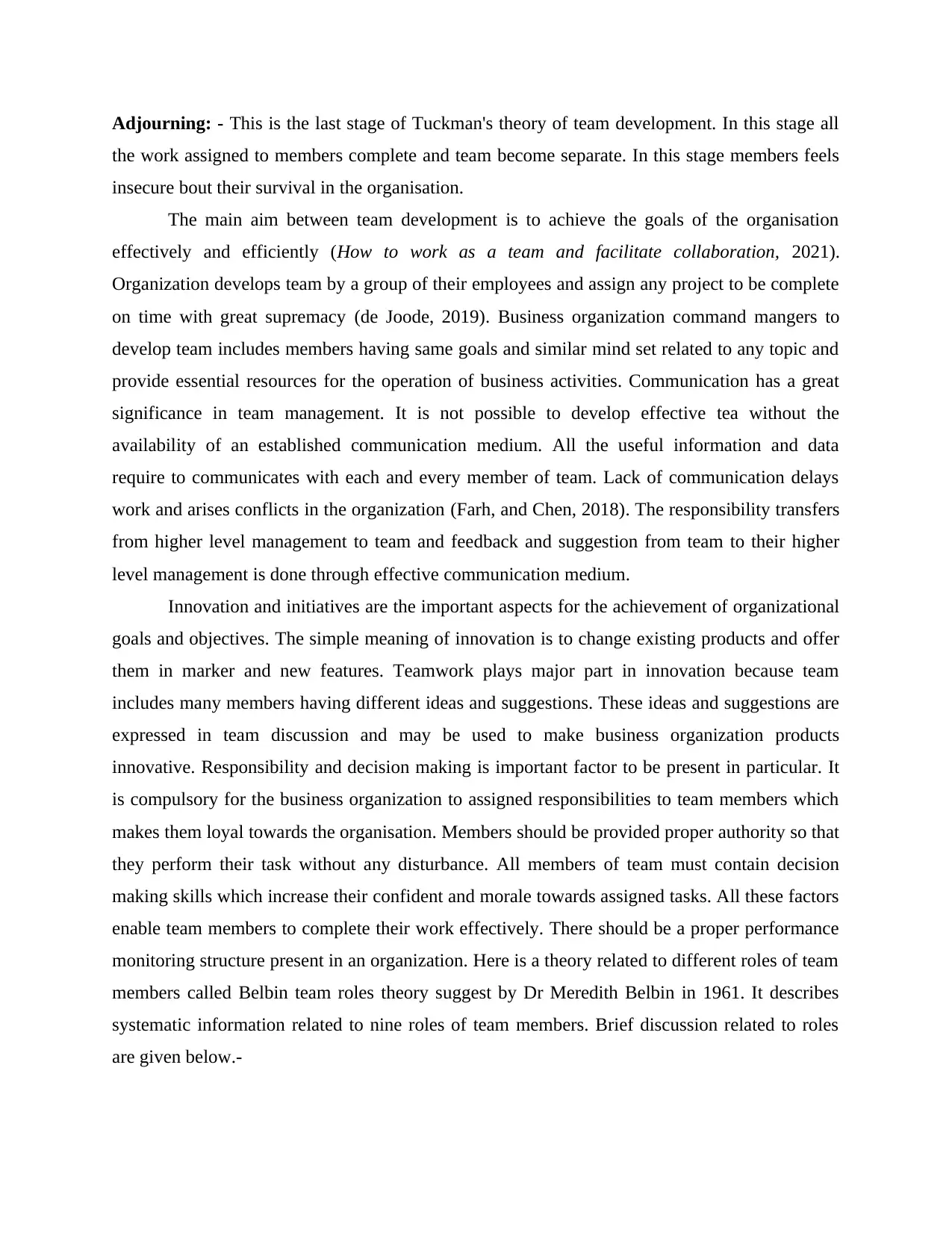
Adjourning: - This is the last stage of Tuckman's theory of team development. In this stage all
the work assigned to members complete and team become separate. In this stage members feels
insecure bout their survival in the organisation.
The main aim between team development is to achieve the goals of the organisation
effectively and efficiently (How to work as a team and facilitate collaboration, 2021).
Organization develops team by a group of their employees and assign any project to be complete
on time with great supremacy (de Joode, 2019). Business organization command mangers to
develop team includes members having same goals and similar mind set related to any topic and
provide essential resources for the operation of business activities. Communication has a great
significance in team management. It is not possible to develop effective tea without the
availability of an established communication medium. All the useful information and data
require to communicates with each and every member of team. Lack of communication delays
work and arises conflicts in the organization (Farh, and Chen, 2018). The responsibility transfers
from higher level management to team and feedback and suggestion from team to their higher
level management is done through effective communication medium.
Innovation and initiatives are the important aspects for the achievement of organizational
goals and objectives. The simple meaning of innovation is to change existing products and offer
them in marker and new features. Teamwork plays major part in innovation because team
includes many members having different ideas and suggestions. These ideas and suggestions are
expressed in team discussion and may be used to make business organization products
innovative. Responsibility and decision making is important factor to be present in particular. It
is compulsory for the business organization to assigned responsibilities to team members which
makes them loyal towards the organisation. Members should be provided proper authority so that
they perform their task without any disturbance. All members of team must contain decision
making skills which increase their confident and morale towards assigned tasks. All these factors
enable team members to complete their work effectively. There should be a proper performance
monitoring structure present in an organization. Here is a theory related to different roles of team
members called Belbin team roles theory suggest by Dr Meredith Belbin in 1961. It describes
systematic information related to nine roles of team members. Brief discussion related to roles
are given below.-
the work assigned to members complete and team become separate. In this stage members feels
insecure bout their survival in the organisation.
The main aim between team development is to achieve the goals of the organisation
effectively and efficiently (How to work as a team and facilitate collaboration, 2021).
Organization develops team by a group of their employees and assign any project to be complete
on time with great supremacy (de Joode, 2019). Business organization command mangers to
develop team includes members having same goals and similar mind set related to any topic and
provide essential resources for the operation of business activities. Communication has a great
significance in team management. It is not possible to develop effective tea without the
availability of an established communication medium. All the useful information and data
require to communicates with each and every member of team. Lack of communication delays
work and arises conflicts in the organization (Farh, and Chen, 2018). The responsibility transfers
from higher level management to team and feedback and suggestion from team to their higher
level management is done through effective communication medium.
Innovation and initiatives are the important aspects for the achievement of organizational
goals and objectives. The simple meaning of innovation is to change existing products and offer
them in marker and new features. Teamwork plays major part in innovation because team
includes many members having different ideas and suggestions. These ideas and suggestions are
expressed in team discussion and may be used to make business organization products
innovative. Responsibility and decision making is important factor to be present in particular. It
is compulsory for the business organization to assigned responsibilities to team members which
makes them loyal towards the organisation. Members should be provided proper authority so that
they perform their task without any disturbance. All members of team must contain decision
making skills which increase their confident and morale towards assigned tasks. All these factors
enable team members to complete their work effectively. There should be a proper performance
monitoring structure present in an organization. Here is a theory related to different roles of team
members called Belbin team roles theory suggest by Dr Meredith Belbin in 1961. It describes
systematic information related to nine roles of team members. Brief discussion related to roles
are given below.-
Paraphrase This Document
Need a fresh take? Get an instant paraphrase of this document with our AI Paraphraser
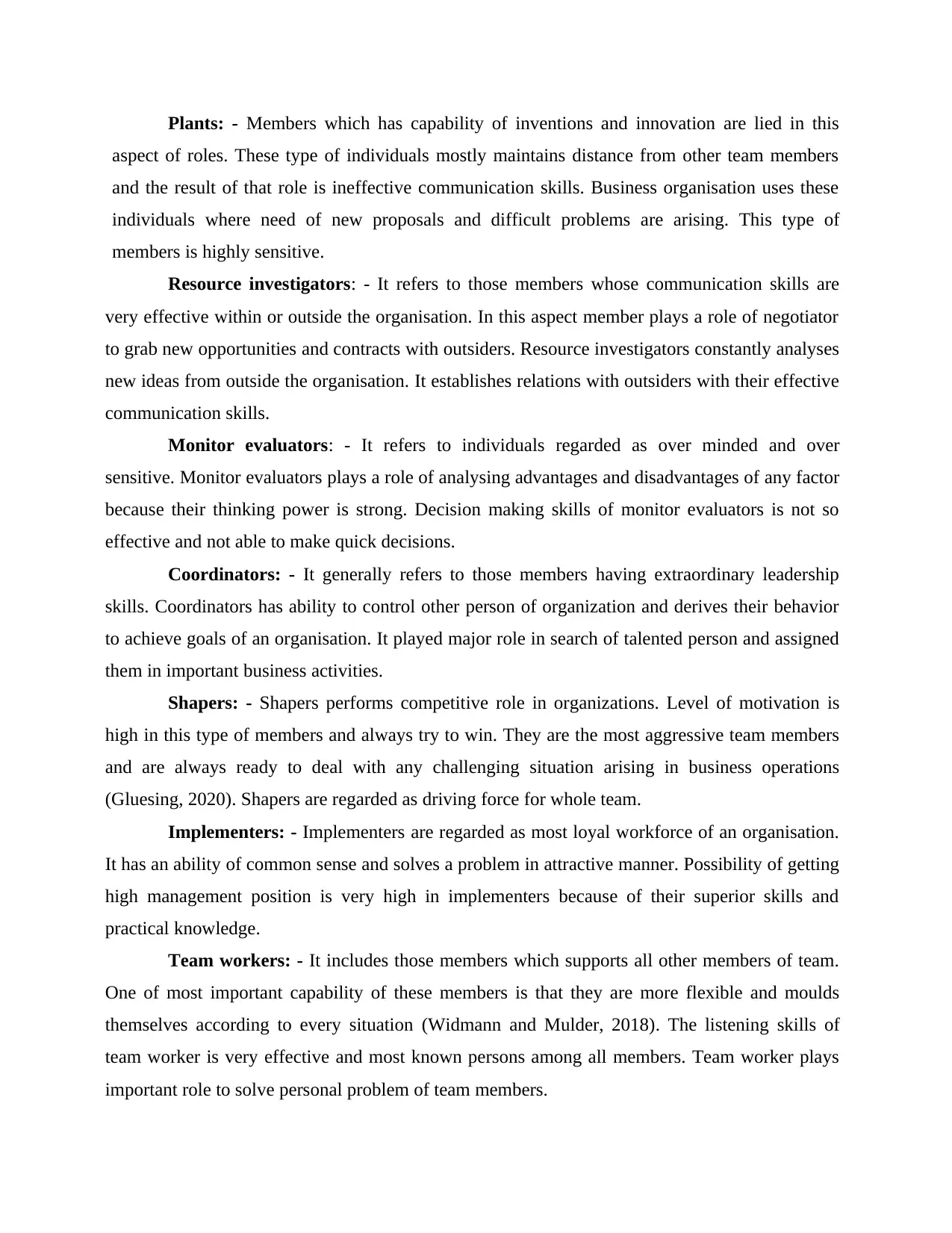
Plants: - Members which has capability of inventions and innovation are lied in this
aspect of roles. These type of individuals mostly maintains distance from other team members
and the result of that role is ineffective communication skills. Business organisation uses these
individuals where need of new proposals and difficult problems are arising. This type of
members is highly sensitive.
Resource investigators: - It refers to those members whose communication skills are
very effective within or outside the organisation. In this aspect member plays a role of negotiator
to grab new opportunities and contracts with outsiders. Resource investigators constantly analyses
new ideas from outside the organisation. It establishes relations with outsiders with their effective
communication skills.
Monitor evaluators: - It refers to individuals regarded as over minded and over
sensitive. Monitor evaluators plays a role of analysing advantages and disadvantages of any factor
because their thinking power is strong. Decision making skills of monitor evaluators is not so
effective and not able to make quick decisions.
Coordinators: - It generally refers to those members having extraordinary leadership
skills. Coordinators has ability to control other person of organization and derives their behavior
to achieve goals of an organisation. It played major role in search of talented person and assigned
them in important business activities.
Shapers: - Shapers performs competitive role in organizations. Level of motivation is
high in this type of members and always try to win. They are the most aggressive team members
and are always ready to deal with any challenging situation arising in business operations
(Gluesing, 2020). Shapers are regarded as driving force for whole team.
Implementers: - Implementers are regarded as most loyal workforce of an organisation.
It has an ability of common sense and solves a problem in attractive manner. Possibility of getting
high management position is very high in implementers because of their superior skills and
practical knowledge.
Team workers: - It includes those members which supports all other members of team.
One of most important capability of these members is that they are more flexible and moulds
themselves according to every situation (Widmann and Mulder, 2018). The listening skills of
team worker is very effective and most known persons among all members. Team worker plays
important role to solve personal problem of team members.
aspect of roles. These type of individuals mostly maintains distance from other team members
and the result of that role is ineffective communication skills. Business organisation uses these
individuals where need of new proposals and difficult problems are arising. This type of
members is highly sensitive.
Resource investigators: - It refers to those members whose communication skills are
very effective within or outside the organisation. In this aspect member plays a role of negotiator
to grab new opportunities and contracts with outsiders. Resource investigators constantly analyses
new ideas from outside the organisation. It establishes relations with outsiders with their effective
communication skills.
Monitor evaluators: - It refers to individuals regarded as over minded and over
sensitive. Monitor evaluators plays a role of analysing advantages and disadvantages of any factor
because their thinking power is strong. Decision making skills of monitor evaluators is not so
effective and not able to make quick decisions.
Coordinators: - It generally refers to those members having extraordinary leadership
skills. Coordinators has ability to control other person of organization and derives their behavior
to achieve goals of an organisation. It played major role in search of talented person and assigned
them in important business activities.
Shapers: - Shapers performs competitive role in organizations. Level of motivation is
high in this type of members and always try to win. They are the most aggressive team members
and are always ready to deal with any challenging situation arising in business operations
(Gluesing, 2020). Shapers are regarded as driving force for whole team.
Implementers: - Implementers are regarded as most loyal workforce of an organisation.
It has an ability of common sense and solves a problem in attractive manner. Possibility of getting
high management position is very high in implementers because of their superior skills and
practical knowledge.
Team workers: - It includes those members which supports all other members of team.
One of most important capability of these members is that they are more flexible and moulds
themselves according to every situation (Widmann and Mulder, 2018). The listening skills of
team worker is very effective and most known persons among all members. Team worker plays
important role to solve personal problem of team members.
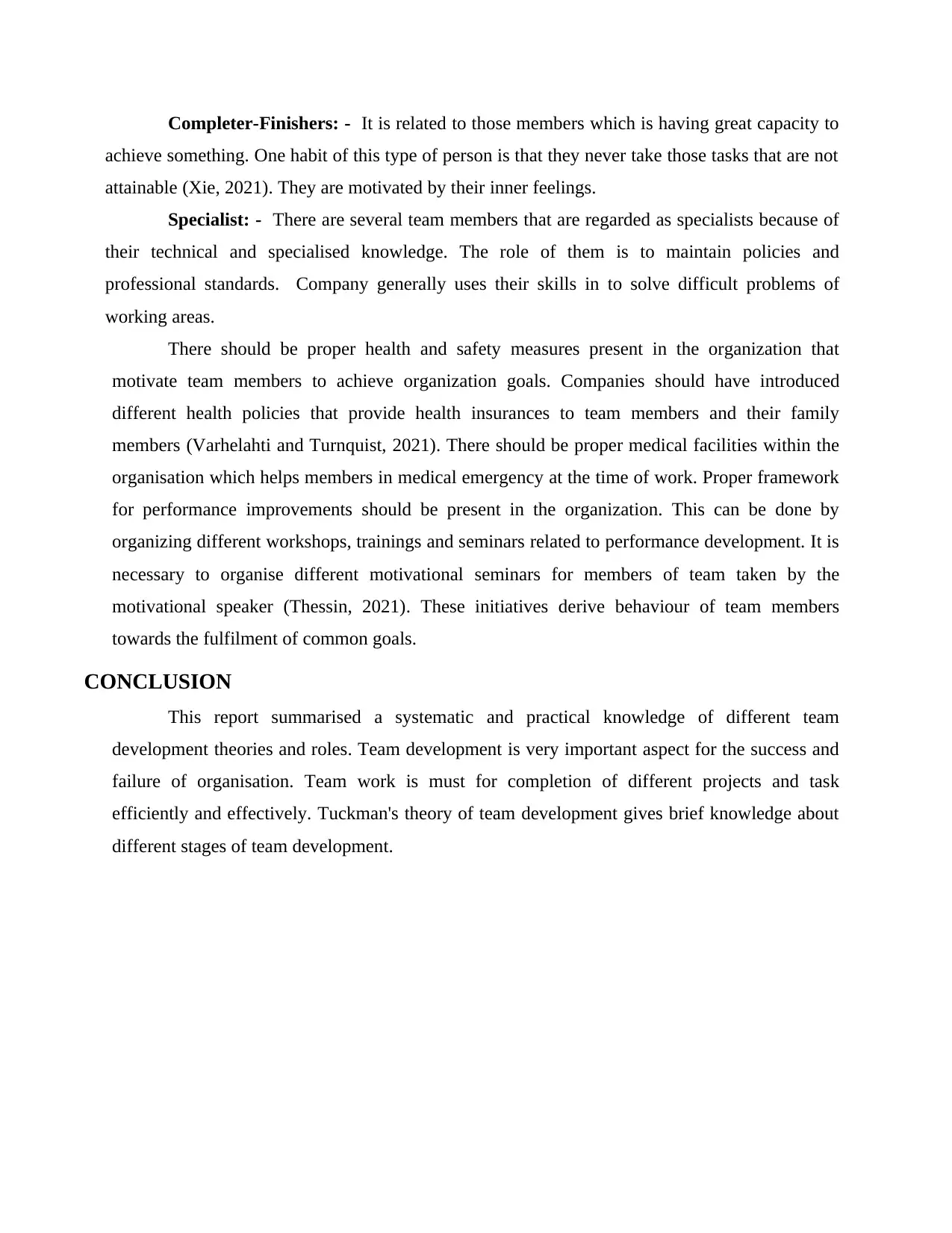
Completer-Finishers: - It is related to those members which is having great capacity to
achieve something. One habit of this type of person is that they never take those tasks that are not
attainable (Xie, 2021). They are motivated by their inner feelings.
Specialist: - There are several team members that are regarded as specialists because of
their technical and specialised knowledge. The role of them is to maintain policies and
professional standards. Company generally uses their skills in to solve difficult problems of
working areas.
There should be proper health and safety measures present in the organization that
motivate team members to achieve organization goals. Companies should have introduced
different health policies that provide health insurances to team members and their family
members (Varhelahti and Turnquist, 2021). There should be proper medical facilities within the
organisation which helps members in medical emergency at the time of work. Proper framework
for performance improvements should be present in the organization. This can be done by
organizing different workshops, trainings and seminars related to performance development. It is
necessary to organise different motivational seminars for members of team taken by the
motivational speaker (Thessin, 2021). These initiatives derive behaviour of team members
towards the fulfilment of common goals.
CONCLUSION
This report summarised a systematic and practical knowledge of different team
development theories and roles. Team development is very important aspect for the success and
failure of organisation. Team work is must for completion of different projects and task
efficiently and effectively. Tuckman's theory of team development gives brief knowledge about
different stages of team development.
achieve something. One habit of this type of person is that they never take those tasks that are not
attainable (Xie, 2021). They are motivated by their inner feelings.
Specialist: - There are several team members that are regarded as specialists because of
their technical and specialised knowledge. The role of them is to maintain policies and
professional standards. Company generally uses their skills in to solve difficult problems of
working areas.
There should be proper health and safety measures present in the organization that
motivate team members to achieve organization goals. Companies should have introduced
different health policies that provide health insurances to team members and their family
members (Varhelahti and Turnquist, 2021). There should be proper medical facilities within the
organisation which helps members in medical emergency at the time of work. Proper framework
for performance improvements should be present in the organization. This can be done by
organizing different workshops, trainings and seminars related to performance development. It is
necessary to organise different motivational seminars for members of team taken by the
motivational speaker (Thessin, 2021). These initiatives derive behaviour of team members
towards the fulfilment of common goals.
CONCLUSION
This report summarised a systematic and practical knowledge of different team
development theories and roles. Team development is very important aspect for the success and
failure of organisation. Team work is must for completion of different projects and task
efficiently and effectively. Tuckman's theory of team development gives brief knowledge about
different stages of team development.
⊘ This is a preview!⊘
Do you want full access?
Subscribe today to unlock all pages.

Trusted by 1+ million students worldwide
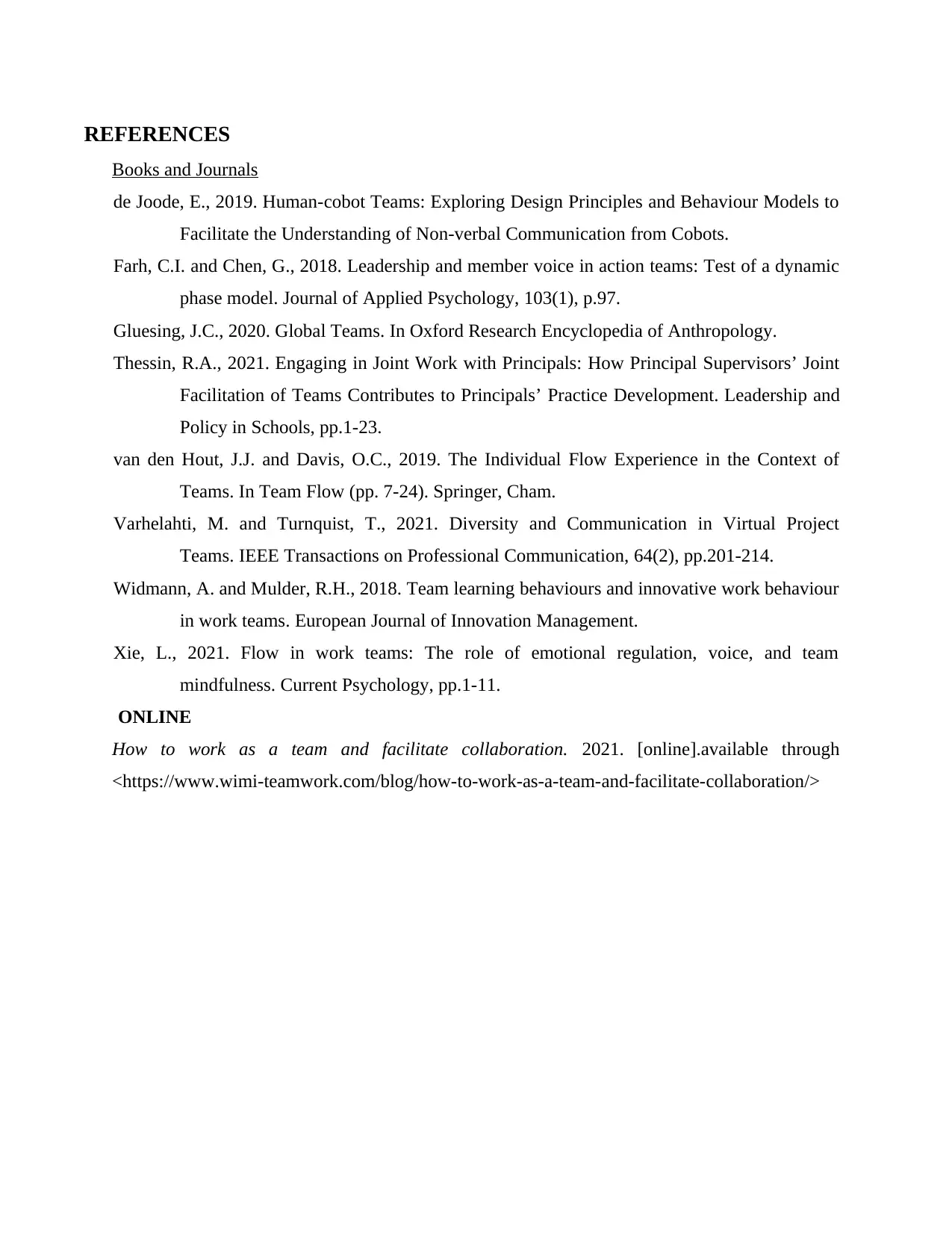
REFERENCES
Books and Journals
de Joode, E., 2019. Human-cobot Teams: Exploring Design Principles and Behaviour Models to
Facilitate the Understanding of Non-verbal Communication from Cobots.
Farh, C.I. and Chen, G., 2018. Leadership and member voice in action teams: Test of a dynamic
phase model. Journal of Applied Psychology, 103(1), p.97.
Gluesing, J.C., 2020. Global Teams. In Oxford Research Encyclopedia of Anthropology.
Thessin, R.A., 2021. Engaging in Joint Work with Principals: How Principal Supervisors’ Joint
Facilitation of Teams Contributes to Principals’ Practice Development. Leadership and
Policy in Schools, pp.1-23.
van den Hout, J.J. and Davis, O.C., 2019. The Individual Flow Experience in the Context of
Teams. In Team Flow (pp. 7-24). Springer, Cham.
Varhelahti, M. and Turnquist, T., 2021. Diversity and Communication in Virtual Project
Teams. IEEE Transactions on Professional Communication, 64(2), pp.201-214.
Widmann, A. and Mulder, R.H., 2018. Team learning behaviours and innovative work behaviour
in work teams. European Journal of Innovation Management.
Xie, L., 2021. Flow in work teams: The role of emotional regulation, voice, and team
mindfulness. Current Psychology, pp.1-11.
ONLINE
How to work as a team and facilitate collaboration. 2021. [online].available through
<https://www.wimi-teamwork.com/blog/how-to-work-as-a-team-and-facilitate-collaboration/>
Books and Journals
de Joode, E., 2019. Human-cobot Teams: Exploring Design Principles and Behaviour Models to
Facilitate the Understanding of Non-verbal Communication from Cobots.
Farh, C.I. and Chen, G., 2018. Leadership and member voice in action teams: Test of a dynamic
phase model. Journal of Applied Psychology, 103(1), p.97.
Gluesing, J.C., 2020. Global Teams. In Oxford Research Encyclopedia of Anthropology.
Thessin, R.A., 2021. Engaging in Joint Work with Principals: How Principal Supervisors’ Joint
Facilitation of Teams Contributes to Principals’ Practice Development. Leadership and
Policy in Schools, pp.1-23.
van den Hout, J.J. and Davis, O.C., 2019. The Individual Flow Experience in the Context of
Teams. In Team Flow (pp. 7-24). Springer, Cham.
Varhelahti, M. and Turnquist, T., 2021. Diversity and Communication in Virtual Project
Teams. IEEE Transactions on Professional Communication, 64(2), pp.201-214.
Widmann, A. and Mulder, R.H., 2018. Team learning behaviours and innovative work behaviour
in work teams. European Journal of Innovation Management.
Xie, L., 2021. Flow in work teams: The role of emotional regulation, voice, and team
mindfulness. Current Psychology, pp.1-11.
ONLINE
How to work as a team and facilitate collaboration. 2021. [online].available through
<https://www.wimi-teamwork.com/blog/how-to-work-as-a-team-and-facilitate-collaboration/>
1 out of 7
Related Documents
Your All-in-One AI-Powered Toolkit for Academic Success.
+13062052269
info@desklib.com
Available 24*7 on WhatsApp / Email
![[object Object]](/_next/static/media/star-bottom.7253800d.svg)
Unlock your academic potential
Copyright © 2020–2026 A2Z Services. All Rights Reserved. Developed and managed by ZUCOL.




